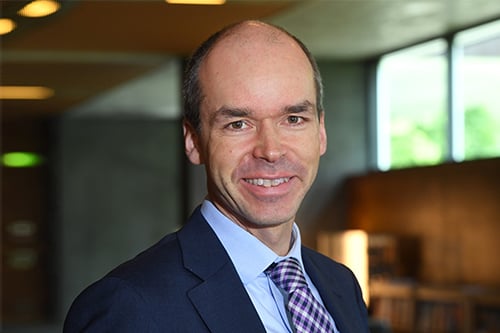

As the COVID-19 crisis continues to evolve, the need for coherent risk analysis has never been more critical as organisations find themselves at risk of overlooking essential concerns due to the urgent nature of the pandemic and its tendency to dominate discourse. Every year since 2013, Swiss Re’s SONAR report has sought to provide insight and generate discussion about the key emerging risks facing the global insurance sector, to enable the industry to continue to build its resilience even in the most turbulent of times.
The latest of these reports has highlighted the risks and trends related to COVID-19 (such as the fragility of healthcare systems and supply chain vulnerabilities) but also emphasised that the pandemic must not overshadow the need for the world to transition to a low-carbon future, and the pivotal role that the insurance industry can play in this ambition. Martin Weymann (pictured), the head of sustainability, emerging and political risk management at Swiss Re, noted that there is no need for exclusivity in terms of focusing just on one risk cluster when it comes to managing emerging risks.
“We can deal with the crisis and build back better,” he said. “And this really means building back in a sustainable way and using some of the funding which is now pledged by many governments around the world to help not only build financial resilience but also societal and environmental resilience.
“I think the COVID-19 crisis has propelled the importance of the societal dimension of sustainability further. Before COVID, clearly climate change was by far the most pressing issue at hand from a sustainability perspective and, I would say, it still is but societal resilience topics have become much more important throughout the crisis.”
Looking at Swiss Re’s sustainability record Weymann noted that, while the global reinsurer has been providing concrete resources regarding sustainability for over two decades, it is really only in the last 10 years that other big players have started to make this an area of real emphasis. And it has only been in very recent years that there has been a more extensive uptake of sustainability efforts across the insurance sector. A much broader set of Swiss Re’s clients now have their own sustainability-focused departments and strategies, which are linked not just to their communication or public affairs functions but increasingly to their core business, which is a very positive development.
“I think that’s a game-changer,” Weymann said. “Sustainability needs to be at the core of what we are doing – with regard to risk transfer solutions, on the underwriting side and on the investment side. Swiss Re was early in developing our own sustainability risk framework, as an example, which we’ve had in its current form for over 10 years, and already started to develop the approach for ESG transaction screening 20 years ago.
“And on the asset management side, Swiss Re made a very bold move in 2017, by putting all our assets under environmental, social and governance criteria, which led to a slightly better performance, on a risk-adjusted basis, and also to less volatility in the portfolio. And I think it was a useful example for others that followed in the last two to three years.”
Examining how the coronavirus might impact the understanding of the need for insurance companies to formulate a global response to the climate crisis, Weymann noted the varying reactions that COVID-19 has prompted.
“You can see that some are saying we have to be more confident in our nation [and displaying] nationalistic tendencies but, on the other hand, you have innovation up to an unprecedented level from before,” he said. “In the medical field, there has been incredible collaboration, and I think that can lead to a very optimistic view as well… And, being in contact with many people on the climate risk side as well, there is a realisation that what we have seen with this pandemic might be like a very short and very time-compressed glimpse of what we could see with climate change, which is a trend risk which will play out over a much longer time horizon.”
The growing realisation is that a lot of effort must be put into thinking hard about how climate change will affect societies, governments and industries and what actions we can take now, he noted. Three factors have become clear with this. Firstly, the need to reduce emissions in the long-term. Secondly, the need for increased climate adaptation measures which insurance is particularly well-suited to provide through natural catastrophe covers, as well as parametric covers. And thirdly, an understanding of how to accelerate the transition to a low carbon, and finally to a net-zero carbon economy by reducing emissions dramatically across industry sectors and also exploring different ways for carbon removal.
The insurance industry, Weymann said, can approach this from two sides – both from a risk transfer solution angle, and also from an investment angle as a long-term investor. Insurance companies can play a very significant role in managing climate risks far beyond this industry.
“That’s particularly true when we talk about climate adaptation and climate transition,” he said. “We help not only governments with our public sector solutions but also many corporate sectors in the real economy to adapt to climate change and support the transition to a net-zero carbon economy. We can be an accelerator which is why [Swiss Re’s] latest sustainability report is called ‘Accelerating Sustainable Progress’ – that’s truly what we mean and what we have at the core of our strategy when we talk about mitigating climate risks and advancing the energy transition, building societal resilience and driving affordable insurance with digital solutions.”
